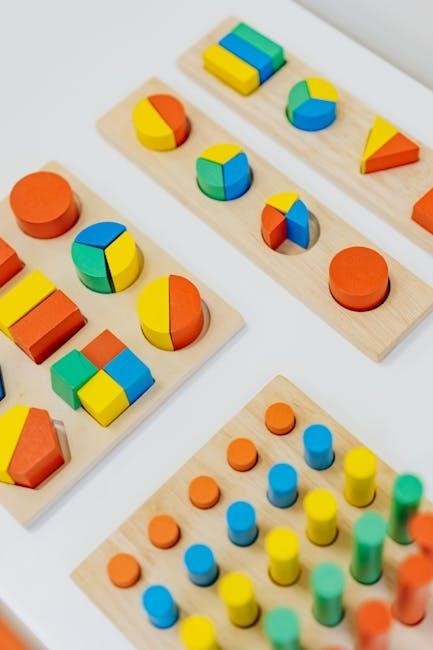Principles of Mathematics 10 by McGraw-Hill Ryerson provides a comprehensive foundation for students to develop essential mathematical skills and concepts․ The program aligns with Ontario curriculum standards, emphasizing real-world applications and problem-solving strategies to prepare students for future academic and professional success․ The textbook integrates investigative activities, clear examples, and digital resources to foster a deeper understanding of mathematical principles․ Designed to build confidence and critical thinking, it serves as a cornerstone for students pursuing STEM fields and beyond․
1․1 Overview of the Course
The Principles of Mathematics 10 course is designed to broaden students’ understanding of mathematical relationships and extend their problem-solving and algebraic skills․ It emphasizes investigation, technology integration, and abstract reasoning to connect mathematical concepts to real-world scenarios․ The program is structured to align with the Ontario curriculum, focusing on key areas such as quadratic equations, trigonometry, and geometric proofs․ Through a combination of real-world contexts, investigative activities, and clear examples, students develop a strong foundation for future academic pursuits․ The course also incorporates digital tools and expert-verified solutions to enhance learning and ensure students are well-prepared for success in various STEM fields and beyond․
1․2 Importance of Mathematics in Daily Life
Mathematics plays a vital role in everyday life, enabling individuals to solve problems, make informed decisions, and understand the world around them․ From budgeting and cooking to measuring distances and managing time, mathematical skills are essential for practical tasks․ The ability to interpret data, analyze patterns, and think critically is invaluable in personal and professional contexts․ Mathematics also underpins fields like technology, healthcare, and engineering, driving innovation and progress․ By fostering problem-solving and analytical thinking, Principles of Mathematics 10 prepares students to navigate real-world challenges confidently and effectively, making math a cornerstone of lifelong learning and success․
1․3 Structure of the McGraw-Hill Ryerson Program
The McGraw-Hill Ryerson Principles of Mathematics 10 program is structured to provide a comprehensive and engaging learning experience․ It includes six key components: the Student Text, Teacher’s Resource, Exercise and Homework Book, Online Learning Centre (OLC), Expert-Verified Solutions, and Additional Digital Resources․ These components work together to support both teachers and students, ensuring a well-rounded understanding of mathematical concepts․ The program aligns with the Ontario curriculum, offering real-world contexts, investigative activities, and clear examples to enhance learning․ This structured approach ensures that students develop problem-solving skills, critical thinking, and confidence in their mathematical abilities, while teachers are equipped with robust resources to guide their instruction effectively․

Key Features of the McGraw-Hill Ryerson Textbook
The McGraw-Hill Ryerson textbook features real-world contexts, investigative activities, and clear examples with step-by-step solutions․ It includes expert-verified solutions and aligns with Ontario curriculum standards․
2․1 Real-World Contexts for Learning
The McGraw-Hill Ryerson textbook introduces mathematical concepts through real-world contexts, making learning relevant and engaging․ By connecting math to practical scenarios, students can better understand abstract ideas and see their application in everyday life․ This approach bridges the gap between theoretical knowledge and real-world problem-solving, fostering a deeper appreciation for mathematics․ The textbook’s focus on contextual learning helps students develop skills that are essential for future academic pursuits and professional success․ This method ensures that students are not only mastering mathematical principles but also gaining the ability to apply them in meaningful ways․
2․2 Investigate Activities for Conceptual Understanding
The McGraw-Hill Ryerson textbook incorporates investigative activities designed to promote conceptual understanding․ These activities encourage students to explore mathematical concepts through guided inquiry, fostering critical thinking and problem-solving skills․ By engaging with real-world problems, students develop a deeper grasp of key principles and their practical applications․ Each activity is carefully structured to align with curriculum outcomes, ensuring students build a strong foundation in mathematics․ This interactive approach complements traditional teaching methods, making learning dynamic and engaging․ The investigative nature of these activities helps students connect abstract ideas to tangible scenarios, preparing them for future academic challenges and fostering a lifelong appreciation for mathematics․
2․3 Clear Examples and Step-by-Step Solutions
The McGraw-Hill Ryerson textbook provides clear examples and detailed step-by-step solutions to help students grasp mathematical concepts effectively․ These examples are presented in a logical sequence, breaking down complex problems into manageable parts․ The solutions are expert-verified, ensuring accuracy and reliability․ By following these explanations, students can develop a systematic approach to problem-solving, fostering confidence and understanding․ The examples are often contextual, relating to real-world scenarios, which enhances their relevance and applicability․ This feature is particularly beneficial for students who need visual or procedural guidance, making it easier for them to master key mathematical principles and apply them to various challenges․

Components of the Principles of Mathematics 10 Program
The program includes a Student Text, Teacher’s Resource, Exercise and Homework Book, Online Learning Centre (OLC), expert-verified solutions, and additional digital resources․
3․1 Student Text
The Student Text is the core component of the McGraw-Hill Ryerson Principles of Mathematics 10 program․ It introduces mathematical concepts in real-world contexts, making learning engaging and relatable․ Each section includes Investigate activities designed to encourage students to explore and understand new ideas independently․ Clear examples and step-by-step solutions are provided to guide students through complex problems, fostering conceptual understanding and practical application․ The text aligns with the Ontario curriculum, ensuring students develop the skills and knowledge required for success in mathematics and beyond․ This resource is tailored to meet diverse learning needs, promoting confidence and mastery of mathematical principles․
3․2 Teacher’s Resource
The Teacher’s Resource for Principles of Mathematics 10 is specifically designed to support educators in delivering an effective and engaging mathematics program․ It provides comprehensive lesson plans, activity ideas, and assessment tools to help teachers address diverse learning needs․ The resource includes expert-verified solutions, enabling teachers to assist students with challenging problems confidently․ Additionally, it offers strategies to integrate technology and real-world applications into classroom instruction․ This guide ensures that teachers are well-equipped to provide a robust mathematical education, aligning with curriculum standards and fostering student success in both academic and practical contexts․
3․3 Exercise and Homework Book
The Exercise and Homework Book for Principles of Mathematics 10 is a essential companion to the Student Text, providing extensive practice opportunities to reinforce learning․ It includes a variety of exercises that align with the Ontario curriculum, covering key concepts and skills․ The book offers step-by-step solutions to selected problems, enabling students to review and understand the correct methods for solving mathematical challenges․ Designed to complement classroom instruction, the exercises focus on real-world applications, helping students connect mathematical concepts to practical scenarios․ This resource is integral for reinforcing understanding, building confidence, and preparing students for assessments and future academic success․
3․4 Online Learning Centre (OLC)
The Online Learning Centre (OLC) for Principles of Mathematics 10 offers a wealth of digital resources to support student learning․ Migrated to Nelson’s platform, it provides interactive activities, digital versions of the textbook, and expert-verified solutions․ Students can access additional practice exercises, video tutorials, and interactive simulations to deepen their understanding of mathematical concepts․ The OLC also includes assessment tools, allowing students to track their progress and identify areas for improvement․ With its flexible access, the OLC enables learning anytime, anywhere, making it an invaluable resource for reinforcing skills and achieving academic success in mathematics․
3․5 Expert-Verified Solutions
Expert-verified solutions for Principles of Mathematics 10 provide students with detailed explanations and step-by-step guidance for solving complex problems․ These solutions, available in both print and digital formats, cover all chapters and exercises, ensuring comprehensive understanding․ They clarify difficult concepts, offer practical examples, and help students grasp mathematical reasoning․ Additionally, the solutions include tips for approaching problems and avoiding common errors, fostering confidence and competence․ By referring to these resources, students can independently review and master the material, making them an essential tool for academic success in the course․
3․6 Additional Digital Resources
The McGraw-Hill Ryerson Principles of Mathematics 10 program offers a variety of additional digital resources to enhance student learning․ These include interactive simulations, video tutorials, and online practice exercises that provide hands-on experience with mathematical concepts․ Digital worksheets and quizzes allow students to test their understanding and track progress․ The Online Learning Centre (OLC) provides access to supplementary materials, such as animated lessons and printable resources․ These tools are designed to cater to different learning styles, offering flexibility and convenience for students to learn at their own pace․ The digital resources also include expert-verified solutions, enabling students to review and master challenging problems effectively․

Curriculum Alignment and Standards
The McGraw-Hill Ryerson Principles of Mathematics 10 program aligns with the Ontario Curriculum, Grades 9 and 10: Mathematics, integrating technology and abstract reasoning to meet specific outcomes․
4․1 Ontario Curriculum, Grades 9 and 10: Mathematics
The McGraw-Hill Ryerson Principles of Mathematics 10 program is carefully aligned with the Ontario Curriculum for Grades 9 and 10, emphasizing foundational mathematical concepts and skills․ The curriculum focuses on developing problem-solving abilities, abstract reasoning, and the effective use of technology․ By adhering to specific outcomes and achievement indicators, the program ensures students gain a deep understanding of mathematical principles․ It supports the development of critical thinking and prepares students for further academic pursuits, aligning with the Ministry of Education’s goals for mathematics education in Ontario․ This alignment ensures a cohesive and comprehensive learning experience for students․
4․2 Specific Outcomes and Achievement Indicators
The McGraw-Hill Ryerson Principles of Mathematics 10 program is structured to meet the specific outcomes and achievement indicators outlined in the Ontario curriculum․ These outcomes focus on developing students’ problem-solving skills, algebraic reasoning, and understanding of mathematical concepts․ The program includes targeted exercises and examples that align with these indicators, ensuring students can demonstrate their mastery of key skills․ The textbook incorporates investigative activities and real-world contexts to engage students and help them achieve the curriculum’s goals․ By aligning with these outcomes, the program provides a clear framework for assessing student progress and understanding in mathematics․
4․3 Integration of Technology and Abstract Reasoning
The McGraw-Hill Ryerson Principles of Mathematics 10 program seamlessly integrates technology and abstract reasoning to enhance student learning; The Online Learning Centre (OLC) provides digital resources, including interactive tools and simulations, to visualize mathematical concepts․ Students can explore abstract ideas through real-world applications, fostering deeper conceptual understanding․ The program encourages the use of technology to solve complex problems, promoting critical thinking and algebraic skills; By combining technology with abstract reasoning, students develop a robust foundation for advanced mathematical studies and practical problem-solving in STEM fields․

Teaching and Learning Strategies
The McGraw-Hill Ryerson program employs real-world contexts, interactive activities, and technology to engage students․ It supports diverse learning styles and promotes collaborative problem-solving, enhancing mathematical understanding through practical applications․
5․1 Encouraging Problem-Solving and Algebraic Skills
The McGraw-Hill Ryerson program emphasizes problem-solving through real-world applications and investigative activities․ Students develop algebraic skills by exploring concepts independently and applying mathematical reasoning to practical scenarios․ The textbook provides clear examples and step-by-step solutions, fostering confidence in tackling complex problems․ Technology integration, such as the Online Learning Centre (OLC), offers additional resources for practice and reinforcement․ These strategies encourage critical thinking, enabling students to approach challenges methodically and creatively․ By aligning with curriculum standards, the program ensures students build a strong foundation in algebra and problem-solving, essential for future academic and professional success in mathematics and related fields․
5․2 Effective Use of Technology in Mathematics
Technology plays a pivotal role in enhancing mathematical learning through the McGraw-Hill Ryerson program․ The Online Learning Centre (OLC) provides interactive activities, digital simulations, and graphing tools to visualize complex concepts․ Students can access expert-verified solutions to homework problems, offering step-by-step guidance for better understanding․ Additionally, the program incorporates online assessments and feedback systems, enabling teachers to track progress and tailor instruction․ By integrating technology, the curriculum fosters engagement, improves problem-solving skills, and prepares students for a digitally driven future․ These tools not only enhance learning but also align with modern educational standards, ensuring students are well-equipped for success․
5;3 Abstract Reasoning and Conceptual Development
The McGraw-Hill Ryerson program emphasizes abstract reasoning and conceptual development through investigative activities and real-world applications․ Students engage in problem-solving that requires critical thinking and algebraic manipulation, fostering a deep understanding of mathematical relationships․ The curriculum encourages students to explore concepts independently, promoting conceptual clarity and the ability to generalize ideas․ By integrating technology and abstract reasoning, the program prepares students to tackle complex mathematical challenges in STEM fields and beyond․ This focus on conceptual development ensures students build a robust mathematical foundation, enabling them to approach problems with confidence and logical precision․

Assessment and Evaluation
The program includes expert-verified solutions and online resources to support homework and quizzes, ensuring students understand and apply mathematical concepts effectively through continuous assessment․
6․1 Components of Student Evaluation
Student evaluation in the McGraw-Hill Ryerson Principles of Mathematics 10 program encompasses a variety of assessment methods to ensure comprehensive understanding․ These include tests, quizzes, investigative activities, and homework assignments․ The program also incorporates projects and real-world applications to evaluate problem-solving skills․ Expert-verified solutions provide clear benchmarks for grading, ensuring consistency and accuracy․ Additionally, the Ontario curriculum standards are integrated into evaluation criteria, focusing on knowledge, understanding, and the ability to communicate mathematical concepts effectively․ This balanced approach ensures students are assessed fairly and thoroughly, preparing them for future academic challenges․
6․2 Learning Skills and Work Habits
The McGraw-Hill Ryerson Principles of Mathematics 10 program places a strong emphasis on developing essential learning skills and work habits․ Students are evaluated on six key areas: responsibility, organization, independent work, collaboration, initiative, and self-regulation․ These skills are integrated into the curriculum to foster a strong foundation for academic success․ The program encourages students to take ownership of their learning through structured activities and real-world applications․ By promoting critical thinking and problem-solving, the curriculum helps students build resilience and adaptability․ These skills not only enhance mathematical proficiency but also prepare students for lifelong learning and future challenges in various fields․
6․3 Course Evaluation and Assessment Strategies
The evaluation of Principles of Mathematics 10 is comprehensive, ensuring students demonstrate mastery of concepts and skills․ Assessments include quizzes, tests, projects, and investigations, providing a balanced measure of understanding․ The program emphasizes formative assessments, such as class discussions and homework reviews, to monitor progress; Summative assessments, like unit tests and a final exam, evaluate overall achievement․ The curriculum aligns with Ontario standards, ensuring consistency and fairness․ Teachers use rubrics and feedback to guide student improvement․ This balanced approach ensures students are well-prepared for future academic challenges while fostering a deep understanding of mathematical principles and their real-world applications․ Regular evaluations help identify areas for growth, supporting student success․

Real-World Applications of Mathematics
Mathematics in Principles of Mathematics 10 connects to real-life scenarios, preparing students for practical problem-solving in fields like finance, science, and engineering․ Everyday applications are emphasized․
7․1 Connecting Mathematical Concepts to Practical Scenarios
The McGraw-Hill Ryerson Principles of Mathematics 10 program emphasizes connecting mathematical concepts to real-world scenarios, making learning relevant and engaging․ Topics are introduced in contexts such as finance, geometry, and algebra, allowing students to see the practical applications of math․ For example, concepts like ratios and proportions are explored through scenarios like budgeting and scaling designs․ This approach helps students develop problem-solving skills that are transferable to everyday life and future careers․ By linking abstract ideas to tangible situations, the program fosters a deeper understanding of how mathematics shapes the world around us․ This connection is key to building lifelong mathematical literacy․
7․2 Developing Problem-Solving Skills for Future Success
The McGraw-Hill Ryerson Principles of Mathematics 10 program is designed to enhance students’ problem-solving abilities, preparing them for future academic and professional challenges․ Through Investigate activities and real-world contexts, students learn to approach mathematical problems methodically, fostering critical thinking and creativity․ The program emphasizes breaking down complex scenarios into manageable parts, a skill essential for success in various fields․ By engaging with practical examples, students develop resilience and confidence in tackling unfamiliar problems․ These skills not only improve academic performance but also equip students with the tools to navigate real-life challenges effectively, ensuring they are well-prepared for their future endeavors․
7․3 Preparing Students for STEM Fields
The McGraw-Hill Ryerson Principles of Mathematics 10 program is specifically designed to prepare students for STEM (Science, Technology, Engineering, and Mathematics) fields by fostering a deep understanding of mathematical concepts․ The textbook emphasizes problem-solving, algebraic skills, and abstract reasoning, which are critical for success in STEM disciplines․ By engaging with real-world examples and investigative activities, students develop the analytical and critical thinking skills necessary for advanced studies and careers in these fields․ The program’s alignment with curriculum standards ensures students are well-equipped to tackle the challenges of STEM education and beyond, providing a solid foundation for their future academic and professional pursuits․

Benefits for Students
Principles of Mathematics 10 equips students with strong foundational skills, enhancing problem-solving abilities and confidence․ It prepares them for STEM fields and future academic challenges effectively․
8․1 Building Strong Mathematical Foundations
The McGraw-Hill Ryerson Principles of Mathematics 10 program focuses on establishing a robust mathematical foundation, ensuring students master essential skills and concepts․ By introducing topics in real-world contexts, the student text encourages conceptual understanding and practical application․ Investigative activities and clear examples with step-by-step solutions help students grasp complex ideas․ The program aligns with Ontario curriculum standards, emphasizing problem-solving, algebraic skills, and abstract reasoning․ This structured approach equips students with the necessary tools to excel in mathematics, preparing them for advanced studies and real-world challenges․
8․2 Enhancing Critical Thinking and Analytical Skills
The McGraw-Hill Ryerson Principles of Mathematics 10 program is designed to strengthen students’ critical thinking and analytical abilities through engaging and challenging content․ Real-world contexts and investigative activities encourage students to explore mathematical concepts independently, fostering deeper understanding and problem-solving skills․ Clear examples and step-by-step solutions provide guidance, while promoting the development of logical reasoning․ The program’s focus on abstract reasoning and technology integration further enhances analytical skills, preparing students to approach complex problems with confidence and precision․ By emphasizing conceptual understanding, the program equips students with the tools to think critically and apply mathematical principles effectively in various scenarios․
8․4 Fostering Confidence in Mathematical Abilities
McGraw-Hill Ryerson’s Principles of Mathematics 10 program is structured to build students’ confidence in their mathematical abilities through a supportive and engaging learning experience․ By introducing topics in real-world contexts, the program helps students relate abstract concepts to practical scenarios, making math more accessible and meaningful․ Investigative activities encourage hands-on exploration, allowing students to develop ownership of their learning․ Clear examples and step-by-step solutions provide clarity, while expert-verified resources and online tools offer additional support․ This approach empowers students to tackle challenges with assurance, fostering a growth mindset and reinforcing their belief in their mathematical capabilities․
McGraw-Hill Ryerson’s Principles of Mathematics 10 program offers a comprehensive, structured approach to learning, aligning with curriculum standards and fostering confidence in mathematical abilities through practical applications and expert support․
9․1 Summary of Key Points
The McGraw-Hill Ryerson Principles of Mathematics 10 program is a comprehensive resource designed to meet Ontario curriculum standards․ It includes a student text, teacher’s resource, exercise book, and online learning centre, providing structured support for both teachers and students․ The program emphasizes real-world applications, investigative activities, and clear examples to enhance conceptual understanding․ With expert-verified solutions and digital tools, it fosters critical thinking, problem-solving, and confidence in mathematical abilities․ Aligning with curriculum outcomes, the program prepares students for academic success and future careers, particularly in STEM fields, by building a strong foundation in mathematical principles and abstract reasoning․
9․2 Final Thoughts on the Importance of Mathematics Education
Mathematics education is foundational for developing critical thinking, problem-solving, and analytical skills essential for lifelong learning․ It fosters logical reasoning, creativity, and adaptability, preparing students for diverse career paths and real-world challenges․ The McGraw-Hill Ryerson Principles of Mathematics 10 program exemplifies this by offering structured, engaging resources that align with curriculum standards․ By nurturing mathematical literacy and confidence, it empowers students to approach complex problems with resilience and innovation․ Investing in quality mathematics education ensures future generations are equipped to thrive in an increasingly technology-driven and interconnected world, making it a cornerstone of modern education․



